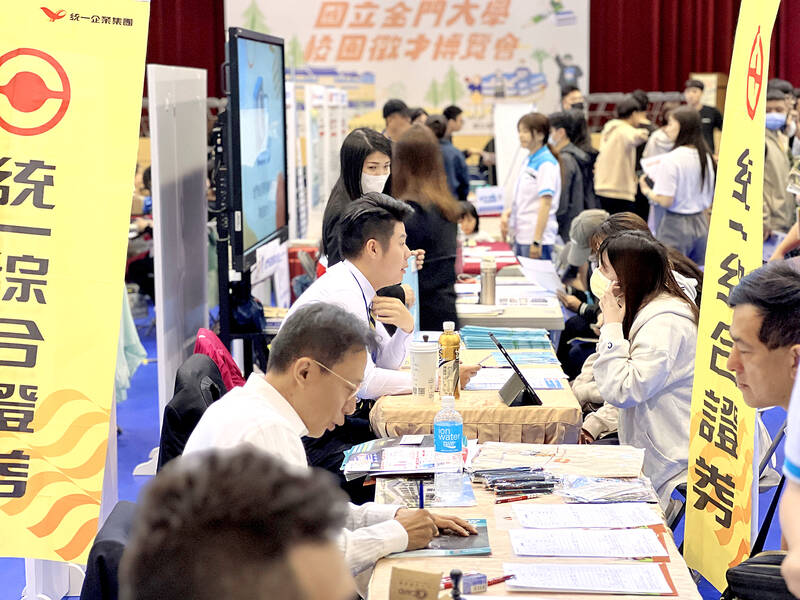Hiring activity in Taiwan would pick up by double percentage points next quarter, as healthcare, transportation and logistics, as well as industrial material sectors are recruiting staff to meet business needs, a survey by ManpowerGroup, which was released on Tuesday, showed.
The human resources advisory firm’s quarterly employment outlook index indicated there would be an 18 percent increase in hirings in the next three months, as 39 percent of companies voiced plans to hire more workers, while 21 percent intend to reduce staff, and 39 percent would not make any changes, according to the survey.
The survey collected responses from 630 Taiwanese companies.

Photo: Wu Cheng-ting, Taipei Times
Firms at healthcare and life sciences sectors showed the strongest recruitment intention at 43 percent, followed by transport, logistics and automotive sectors at 41 percent, and industrial and material industry at 31 percent, it said.
Lai Yi-wen (賴怡文), managing partner of the professional talent business at ManpowerGroup, said the findings came as little surprise, since the world assigns more importance to healthcare following the COVID-19 pandemic.
The trend explained why workforce demand at healthcare and life sciences sectors spiked 23 percent from three months earlier, Lai said.
Medical facilities generally adopt a proactive approach in developing smart healthcare systens and drugstore chains move to expand their scale, Lai added.
High turnover among frontline workers also contributed to tight demand and employers have to take action beforehand to prevent workforce shortages, the survey showed.
Taiwan’s aging population is driving up workforce demand at long-term care and chronic disease management facilities, ManpowerGroup said, adding that medical institutions have been recruiting professionals.
At the same time, these sectors have made efforts to hire workers with digital solution capabilities in the belief that digital transformation would play an important role in the future of healthcare, it said.
Human recruitment remains active at transport, logistics and automotive sectors — though a bit subdued from the preceding quarter — as demand for domestic and cross-border tourism stays resilient, ManpowerGroup said.
Operators are looking to speed up digital transformation, improve the working environment, battle a persistent lack of workforce and boost operational efficiency, it said.
The latest employment outlook suggests a 20 percent gain from the previous quarter for industrial and materials sectors, it said.
Lai attributed the recruitment need to the government’s social housing projects, as well as local technology and manufacturing firms building plants in Taiwan and overseas.
Additionally, reconstruction works related to the April 3 earthquake in Hualien would create 1,000 job opportunities, Lai said.
People with prior experience in clean room, electronics, mechanics, refrigeration and air-conditioning would be keenly sought after, Lai said.

SEEKING CLARITY: Washington should not adopt measures that create uncertainties for ‘existing semiconductor investments,’ TSMC said referring to its US$165 billion in the US Taiwan Semiconductor Manufacturing Co (TSMC, 台積電) told the US that any future tariffs on Taiwanese semiconductors could reduce demand for chips and derail its pledge to increase its investment in Arizona. “New import restrictions could jeopardize current US leadership in the competitive technology industry and create uncertainties for many committed semiconductor capital projects in the US, including TSMC Arizona’s significant investment plan in Phoenix,” the chipmaker wrote in a letter to the US Department of Commerce. TSMC issued the warning in response to a solicitation for comments by the department on a possible tariff on semiconductor imports by US President Donald Trump’s

‘FAILED EXPORT CONTROLS’: Jensen Huang said that Washington should maximize the speed of AI diffusion, because not doing so would give competitors an advantage Nvidia Corp cofounder and chief executive officer Jensen Huang (黃仁勳) yesterday criticized the US government’s restrictions on exports of artificial intelligence (AI) chips to China, saying that the policy was a failure and would only spur China to accelerate AI development. The export controls gave China the spirit, motivation and government support to accelerate AI development, Huang told reporters at the Computex trade show in Taipei. The competition in China is already intense, given its strong software capabilities, extensive technology ecosystems and work efficiency, he said. “All in all, the export controls were a failure. The facts would suggest it,” he said. “The US

The government has launched a three-pronged strategy to attract local and international talent, aiming to position Taiwan as a new global hub following Nvidia Corp’s announcement that it has chosen Taipei as the site of its Taiwan headquarters. Nvidia cofounder and CEO Jensen Huang (黃仁勳) on Monday last week announced during his keynote speech at the Computex trade show in Taipei that the Nvidia Constellation, the company’s planned Taiwan headquarters, would be located in the Beitou-Shilin Technology Park (北投士林科技園區) in Taipei. Huang’s decision to establish a base in Taiwan is “primarily due to Taiwan’s talent pool and its strength in the semiconductor

French President Emmanuel Macron has expressed gratitude to Hon Hai Precision Industry Co (鴻海精密) for its plan to invest approximately 250 million euros (US$278 million) in a joint venture in France focused on the semiconductor and space industries. On his official X account on Tuesday, Macron thanked Hon Hai, also known globally as Foxconn Technology Group (富士康科技集團), for its investment projects announced at Choose France, a flagship economic summit held on Monday to attract foreign investment. In the post, Macron included a GIF displaying the national flag of the Republic of China (Taiwan), as he did for other foreign investors, including China-based